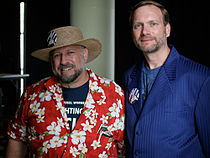Gutenberg kè-ōe
Gutenberg kè-uē (ing-gú: Project Gutenberg (PG)) sī tsi̍t-hāng bo̍k-tik teh sòo-uī-huà hām tsûn-tóng bûn-huà tsok-phín, í-ki̍p "kóo-lē tiān-tsú-tsheh ê tshòng-tsok kah huat-hîng" ê tsì-guān-tsiá ua̍h-tāng.[2] Gutenberg kè-uē iû Bí-kok tsok-ka Michael S. Hart tī 1971-nî tshòng-li̍p, sī li̍k-sú siong- iu-kiú ê sòo-jī tôo-su-kuán.[3] Gutenberg kè-uē siu-tsông ê tuā-pōo-hūn hāng-bo̍k sī kong-kiōng líng-i̍k ê tsheh-tsik hi̍k-tsiá kò-jîn kòo-sū ê tsuân-bûn. Sóo-ū bûn-kiānn lóng ē-tàng teh sóo-ū uá-beh jīm-hô tiān-náu tíng-kuân lóng ē-tàng iōng ê khai-hòng keh-sik pòo-kio̍k tsi-hā bián-huì kiat-tshù. Tsiat-tsí 2015-nî 10-gue̍h 3-ji̍t, Project Gutenberg ê bián-huì tiān-tsú-tsheh siu-tsông í-king ta̍t-kàu 50,000-kiānn.[4]
 | |
| Established | 1971 nî 12 goe̍h (huat-pòo ê tē-1 hūn bûn-kiānn)[1] |
|---|---|
| Collection | |
| Size | Tshiau-kuè 60,000 hūn bûn-kiānn |
| Website | gutenberg |

Tsia–ê pán-pún sī iōng sûn bûn-pún í-kip kî-thann keh-sik thê-kiong, pí-jū HTML, PDF, EPUB, MOBI kah Plucker. Tāi-to-sòo pán-pún lóng-sī ing-bûn ê; m̄-kuh mā-ū tsiânn-tsē hui ing-bûn ê tsok-phín. Ū tsiânn-tsē ê hù-sio̍k kè-uē hāng-bo̍k thê-kiong gia̍h-guā lāi-iông; pau-kuat ti̍k-tīng tē-khu hām ti̍k-tīng gú-giân ê tsok-phín. Project Gutenberg hām hun-suànn-sik kàu-tuì-khì bi̍t-tshiat siong-kuan; Distributed Proofreaders sī tsi̍t-ê khiā-tī Internet ê iōng-teh kàu-tuì sàu-biâu bûn-pún ê siā-khu. Project Gutenberg í Johannes Gutenberg ê miâ-jī lâi hō-miâ, Gutenberg teh au-tsiu ín-ji̍p ua̍h-jī ìn-suat-su̍t.
Tsí-buē kè-uē
Tsí-buē kè-uē ê tshing-tuann
Sóo-ū tsí-buē ê kè-uē[5] lóng-sī ióng-iú kâng-khuán lí-liām ê to̍k-li̍p tsoo-tsit; pīng-tshiánn hi̍k-tsún sú-iōng Project Gutenberg siong-piau. In thong-siông ū ti̍k-tīng ê kok-ka hi̍k-tsiá gú-giân tiōng-tiám.[6]
- Project Gutenberg Australia hosts many texts that are public domain according to Australian copyright law, but still under copyright (or of uncertain status) in the United States, with a focus on Australian writers and books about Australia.[7]</ref>[5]
- Project Gutenberg Canada.[8][5] digital library for Canadian public domain texts.
- Projekt Gutenberg-DE claims copyright for its product and limits access to browsable web-versions of its texts.[9][5]
- Project Gutenberg Europe is run by Project Rastko in Serbia. It aims at being a Project Gutenberg for all of Europe, and began posting projects in 2005. It uses the Distributed Proofreaders software to quickly produce etexts.[10]
- Project Gutenberg Luxembourg publishes mostly, but not exclusively, books that are written in Luxembourgish.[11]
- Projekti Lönnrot, started by Finnish Project Gutenberg volunteers, derives its name from the Finnish philologist Elias Lönnrot (1802–1884)[12]
- Project Gutenberg of the Philippines aims to "make as many books available to as many people as possible, with a special focus on the Philippines and Philippine languages".[13]
- Project Gutenberg Russia (Rutenberg) aims to collect public domain books in Slavic languages, particularly in Russian. The discussion of the project and its legal side began in April 2012. The word Rutenberg is a combination of words "Russia" and "Gutenberg".[14]
- Project Gutenberg Self Publishing Portal also known as Project Gutenberg Self-Publishing Press, by the Project Gutenberg Consortia Center[5][15] Unlike the Gutenberg Project itself, Project Gutenberg Self-Publishing allows submission of texts never published before, including self-published ebooks.[16] Launched in 2012,[15][17] also owns the "gutenberg.us" domain.[18]
- Project Gutenberg of Taiwan seeks to archive copyright free books with a special focus on Taiwan in English, Mandarin and Taiwan-based languages. It is a special project of Forumosa.com[19]
- Projekt Runeberg, Nordic literature[5]
- ReadingRoo.ms, the home of the Project Gutenberg PrePrints[5]
Hun-ki ki-kòo
- Internet Archive, í-tsîng ê tn̂g-kî pī-hūn hun-huat tsām-tiám kah1 í-tsîng ê tsú-iàu tsú-ki tsiām-tsiám.[5]
- LibriVox, sin-ê ū-siann to̍k-bu̍t tsú-iàu ha̍p-tsok kâng-phuānn.[5]
Tsù-kái
Tsham-ua̍t
- Aozora Bunko
- Chinese Text Project
- Google Books
- HathiTrust
- Internet Archive
- LibriVox—free online audiobook library, with many texts used from Project Gutenberg
- List of digital library projects
- On-line Guitar Archive
- Open Content Alliance
- Project Runeberg, for books significant to the culture and history of the Nordic countries.
- Runivers, for Russian historical documents
- Sefaria, for Jewish texts
- Standard Ebooks
- Virtual volunteering
- Wikisource or Project Sourceberg
- Distributed Proofreaders
Guā-pōo liân-kiat
- Koaⁿ-hong bāng-chām
- Distributed Proofreaders – a worldwide group of volunteer editors that is now the main source of eBooks for Project Gutenberg
- Project Gutenberg News – Official News for Gutenberg.org. Includes the Newsletter Archives, 1989–Present.
- Project Gutenberg Monthly Newsletter
- Gutenberg kè-ōe teh DMOZ
- Gutenberg tī Project Gutenberg ê chok-phín
- Gutenberg kè-ōe tī Internet Archive ê chok-phín